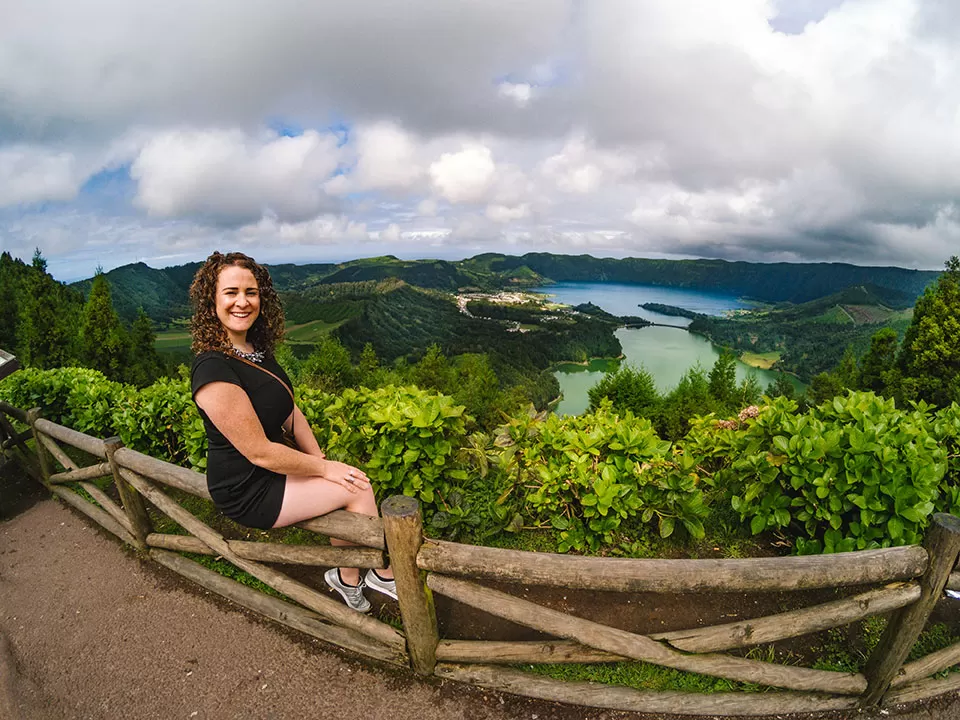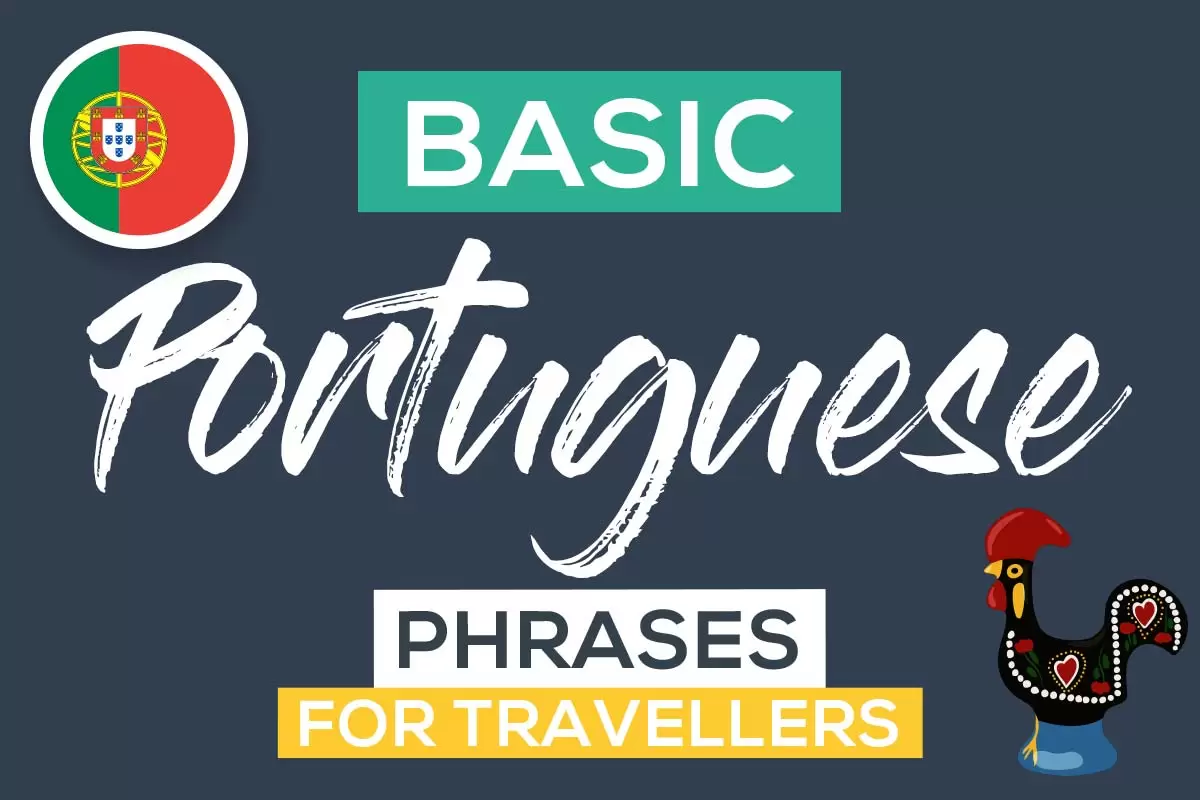Whilst wandering amongst the medieval castles and cobblestone villages, make your Portugal experience even more special and learn these common Portuguese phrases.
Having just returned from a once in a lifetime trip to the volcanic archipelago of the Azores (something I highly recommend), I thought it appropriate to dedicate my next post in my travel phrase guide series to Portuguese! That’s right, I’ve brought together a bunch of super useful and common Portuguese phrases along with a pronunciation guide.
Even though Portugal covers a relatively small area, it played a crucial role in world history.
During the 15th and 16th centuries, Portugal started a major chapter in world history with the New World Discoveries known as “Descobrimentos” in Portuguese.
As the Portuguese established a sea route to India, colonized areas in Africa (including Angola, Mozambique, Cape Verde), South America (Brazil), Asia (Macau), and Oceania (East-Timor) thus creating an empire.
It is because of this that the Portuguese language continues to be the biggest connection between these countries and a great reason for learning the language.
Why else should you learn Portuguese? Well, it makes learning other languages, especially Romance languages like Spanish, Italian, French and Romanian much easier.
Want to have fun whilst learning European Portuguese or Brazilian Portuguese? Struggling to find decent Portuguese language resources available? I recommend getting uTalk. Available as a desktop site and app, uTalk is awesome for learning key words and phrases in Portuguese (both European and Brazilian), especially if you want to use it for travel purposes. It’s great for beginners getting started in a language and invaluable for intermediates looking to fill in gaps in their vocabulary and pronunciation.
What I love most about uTalk is that you can jump around their extensive library of topics and choose what you want to learn, when you want, and at your own pace. Because I believe in uTalk so much, I reached out to them and we’ve teamed up to offer you an exclusive 30% OFF reader discount across all of uTalk’s 140 languages! This offer isn’t available anywhere else! Click here to claim your exclusive 30% discount in Brazillian Portuguese and European Portuguese here.
Let’s take a quick look at the Portuguese language so you’re a bit more clued up on its origin, use, and vocabulary.
I hope you enjoy this post as much as I enjoyed bringing it together. If you have any requests for other languages, let me know in the comments section!
Where is Portuguese spoken?
Portuguese is the sole official language of Portugal, Brazil, Cape Verde, Guinea-Bissau, Mozambique, Angola, and São Tomé and Príncipe.
It also has official language status in East Timor, Equatorial Guinea, and Macau in China! (The latter came as a surprise to me too!)
As mentioned above, due to the expansion during colonial times, Portuguese and Portuguese creole speakers can also be found in Goa, India, Sri Lanka; Indonesia, Malaysia, and the Caribbean where Papiamento is spoken, while Cape Verdean Creole is the most widely spoken Portuguese-based Creole.
In both English and Portuguese, Portuguese-speaking people and nations are referred to as “Lusophone”.
There are well over 250 million Portuguese native speakers, with 200 million of that population residing in Brazil!
The Portuguese in this travel phrase guide is of the European usage which differs from the Brazilian in both sounds and pronunciation. Read my guide on the main differences between Brazilian Portuguese and European Portuguese.
A brief history of Portuguese
Being a Romance language, Portuguese is a descendant of Latin, which was brought to the Iberian Peninsula by Roman soldiers, settlers, and merchants from 218 BC.
It wasn’t until 1290 that King Denis decreed that Portuguese, which was simply called the “Vulgar language” (i.e. Vulgar Latin) should be known as the “Portuguese language” and should be used officially. By the 15th century, Portuguese had become a mature language with a rich literature.
Because of the New World Discoveries made between the 14th and 16th century, the great majority of Portuguese speakers live in Brazil, in South America.
Portuguese Vocabulary
Even though the Portuguese and Brazilians speak the same language, due to cultural and historical differences the language has evolved over the years. Curious at just how different European Portuguese is from Brazilian Portuguese?
Here are some examples of just how different it can be.
| English | BR Portuguese | EU Portuguese |
|---|---|---|
| Train | Trem | Comboio |
| Bus | Ônibus | Autocarro |
| Suit | Terno | Fato |
| Buttocks | Bunda | Rabo |
| Ice Cream | Sorvete | Gelado |
| Cup | Xícara | Chávena |
| Refrigerator | Geladeira | Frigorífico |
| Brown | Marrom | Castanho |
Portuguese Pronunciation
Whilst there are loads of pronunciation rules out there (too many to list here for simple travel phrase guide), as a general rule of thumb, remember to place the stress on the penultimate (second-last) syllable.
Here come the exceptions…
Don’t stress the penultimate syllable if it has an accent, or the word ends with a diphthong (that is, 2 vowels which are pronounced as a single syllable), or if it ends with any of the following letters: i, l, r, z, im, um, ins, uns – in which case, the stress is on the last syllable.
P.S. If you’re reading this on your phone and can’t see the pronunciation column, turn it to landscape mode. For some reason, tables aren’t mobile friendly. Sorry!
Basic Portuguese Phrases for Travellers
Want the infographic to take with you? Scroll to the bottom of the page.
Greetings
Essentials
Questions
Eating Out
Getting Around
Numbers
Days
Emergencies
Like it? Pin it for later!
Want more? Here are some hilarious Portuguese expressions!
Want to visit Portugal? Don’t miss these travel guides
- 11 Reasons Why You Should Visit the Azores in Portugal
- 5 Day Azores Itinerary – 26 Top Things to do on São Miguel Island
- Top 10 things to do in Ponta Delgada – The Capital of the Azores
- 34 Best Things to do in Madeira, Portugal (The Ultimate Guide)
- 12 Awesome Things to do in Funchal, Madeira (Includes Travel Tips & Top-Rated Tours)
Want to know more about learning languages? Start here!
- 25 Hilarious Portuguese Phrases That Make No Sense
- 8 Surprising Differences Between Brazilian Portuguese and Portugal Portuguese
- Top Language Learning Resources You Should Use
- 11 Life-Changing Reasons Why You Should Learn a Language
- 42 beautiful Inspirational Quotes for Language Learners
- Language learning tips: 11 Polyglots Reveal The Secrets of Their Success
- Top 10 Best Ways to Learn a Language Better and Faster
- How Many Languages are there in the World?
Over to you!
Which of these common Portuguese phrases do you find most useful? Which other phrases would you like to know? Let me know using the comments section below or join me on social media to start a conversation.
Thanks for reading and I hope you enjoyed this post.
Like what you see? Subscribe using the form below to have all of my posts delivered directly to your email.




2 comments
Hi Michele,
Great article, it’s really funny to see my own language dissected like that!
Thank you for the highlight on Portugal and the Portuguese language!
Beijinhos
Hey Michele. What a great article. These will come in very handy for my next trip. Keep up the good work.